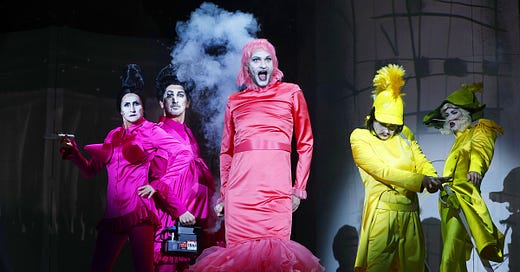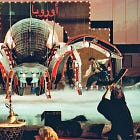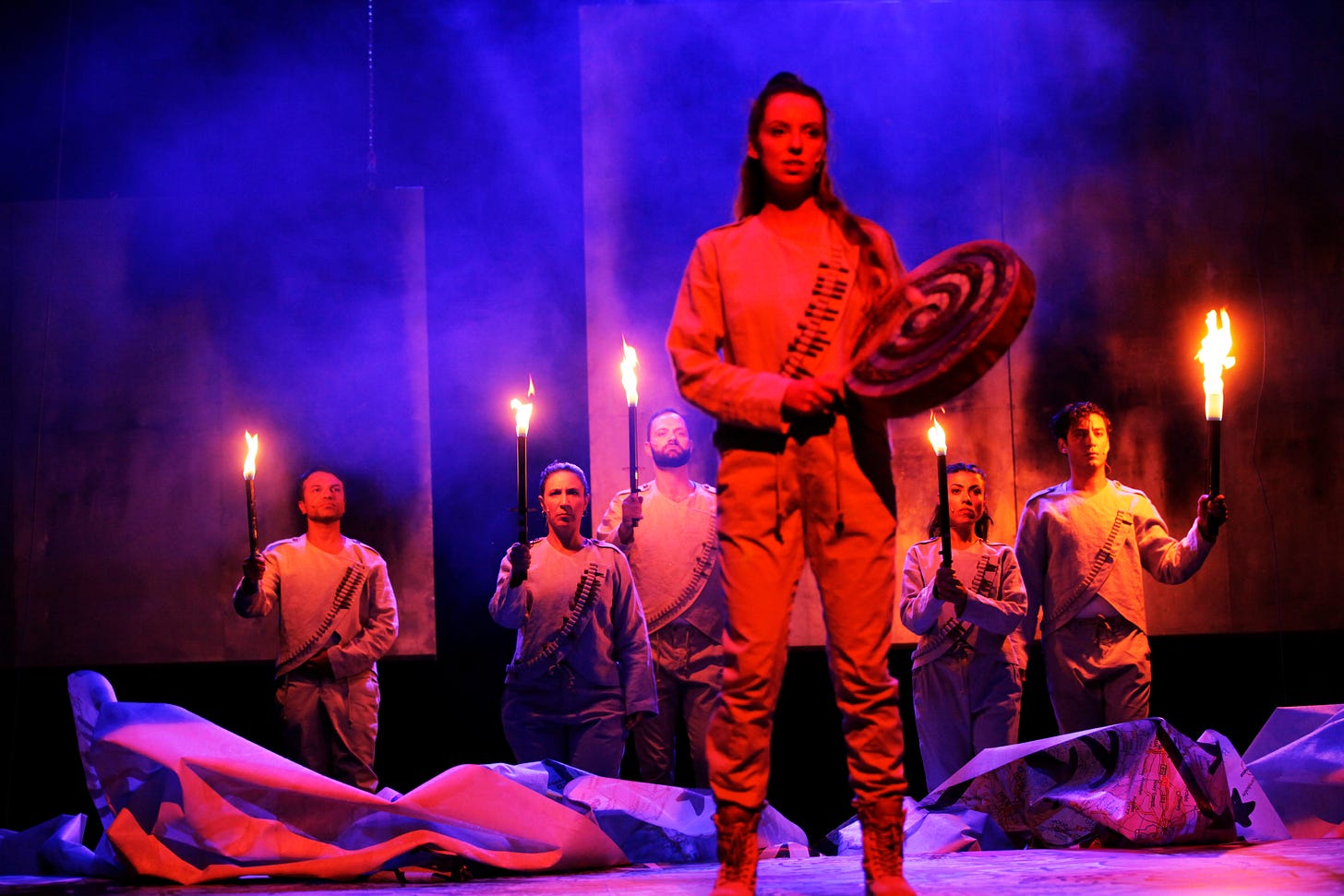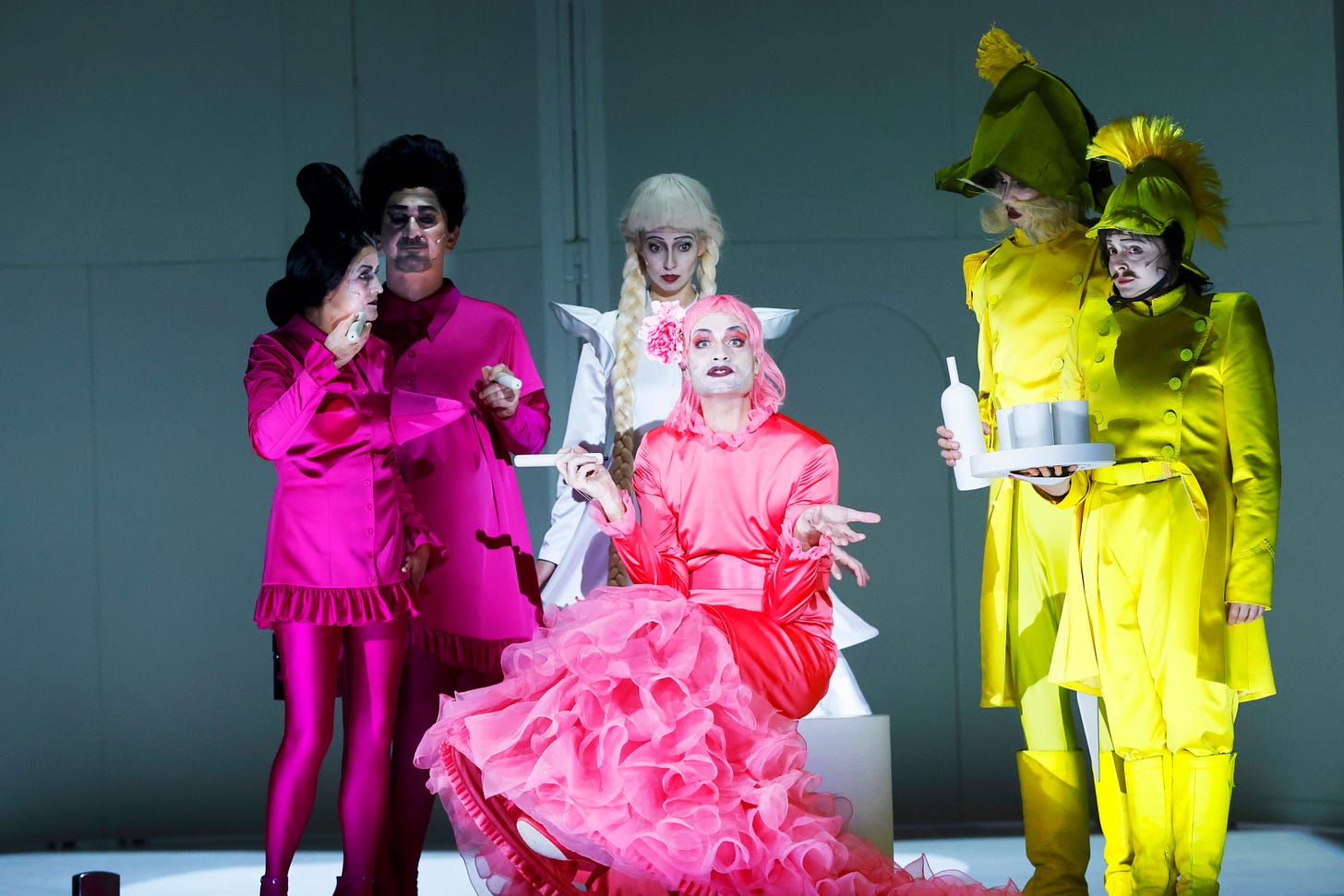Carmen disruption: Interrogating Romani stereotypes in Bizet's opera
On Christian Weise's colourful reframing of Carmen for the Maxim Gorki Theatre.
I’m still in Berlin this week where I’ve been interspersing trips to the theatre with a fairly rigorous exploration of the wine bars and coffee shops of Kreuzberg.
While my knowledge of opera is limited, I was intrigued to see what the Maxim Gorki Theatre would do with Carmen and enjoyed talking to UK actor and musician Riah Knight - who I last saw cooing over a box of vibrators in a Quaker Meeting House in Edinburgh - about her role in the production.
If you want to support my writing while keeping this site largely paywall-free (though there will be occasional paid subscriber bonus posts, like this one on Robert Lepage’s Faith, Money, War and Love), you can do so for just £5 a month or £50 a year. Or just share this newsletter with someone you think might find it interesting. That helps too.
In Christian Weise’s new production for the Maxim Gorki Theatre, the Swedish actor Lindy Larsson plays Carmen in a pink tulle dress with matching wig, a stage-filling personality and a deep, resonant voice.
Weise’s production is fizzy and visually vivid. The costume design, by Lane Schäfer, is a treat, the actors are all decked out in sweetshop colours - shades of bubble gum and lemon drop yellow - which pop against designer Julia Oschatz’s black-and-white animated backdrops. The soldiers’ uniforms have more than a dash of Sgt. Pepper to them and Micaela, the pure, pale village maiden – played by Knight, Carmen’s antithesis and the only character dressed in white – has pigtails that fall to her knees. The characters look like human cartoons, with goldfish bowl bellies and foot-long rapier moustaches, or Madonna-esque conical tits. They smoke ridiculously fat cigarettes lit by the plume from a stage smoke machine. The performances are pitched to match, with an exaggerated comedia del arte vibe and a lot of eyebrow action. Don Jose is played by Via Jikeli with an endearingly big-eyed, nervy energy. She’s fantastic, at once puppy-like and shifty, while Larsson, as mentioned, knows how to own a stage (while writing this I spotted that he previously played Hedwig in Malmo in Sweden, and I would fucking love to see that). His Carmen is tart and wry, and highly aware of being a character in a story, while also transcending caricature and hitting some surprising emotional beats.
This is a stripped-down sprint through Bizet’s opera. (“We’ve only got three musicians,” says Larsson’s Carmen with an edge of disdain, and “we’re not even proper singers.”) It’s not exactly a parody, but it’s also far from a straight-up staging. “By having a gay Romani traveller play Carmen, we’re already offering a radical reinterpretation of the role,” says Knight when we meet for coffee a couple of days later.
Like many recent productions, it also engages with the problematic nature of Carmen as a character. One of the most popular figures in opera, she’s also a symbol of the exotic and disruptive ‘other.’ The opera drew on the 1845 novella by Prosper Mérimée, written at a time when there was considerable appetite for stories involving Roma among white European readers, and the opera replicates the romanticisation of their way of life which was popular at the time.
Throughout the performance Larsson provides a dry commentary on Carmen’s many iterations over the years. These textual interventions were written by Larsson and Knight, both of whom have Romani heritage.
Knight, a British-Romani artist, made her debut at the Maxim Gorki Theatre when she was invited to perform in Yael Ronen’s Roma Armee in 2017, a performancein which Larsson also starred. That show became one of the Gorki’s biggest hits of recent years and Knight has been a regular guest performer at the Gorki ever since, often working with Ronen. She has also collaborated with RomaTrial and the European Roma Institute for Arts and Culture (ERIAC) to work for increased Romani visibility in the arts.
Roma Armee was a landmark production in many ways, the first time that Romani people got to present their stories on a national stage. (It’s difficult to imagine a production of similar scale about the Romani experience happening in the UK).
When Knight and Larsson were asked by Gorki to work on Carmen, they were both very aware of the size and weight of the task at hand. It’s such a well-known opera, such an iconic role. “Carmen is such a famous character,” says Knight. She looms large both in popular culture and within the Romani arts and culture scene, “because she's one of the main representations of Romani women, or Romani culture. So people are engaged with her legacy.” There’s so much that can - and has - been said about Carmen, it was difficult to know how deep to go. “Exactly how many layers do you deconstruct?” asks Knight, “because once you start to pick at the opera, it's endless.”
The production process also presented other challenges. “Not everyone is coming at this from the same place,” she says. When you’re interrogating the Romani stereotypes embedded in Carmen, you also have to address the stereotypes and preconceptions that still persist. “Everyone had the will to do it right and do it well, but not everyone shared the same perspective,” she explains. “This was the challenge for me and Lindy - what was obviously a racist stereotype to us, could for somebody else be how they'd always understood Romani people and still see them today.”
The process became easier when Knight and Larsson started to think of Carmen “not as a Romani woman who was real, but as a character who was created to serve a dramatic purpose in a plot.” That took some of the pressure off. It enabled us, says Knight, “to use the space we’ve been given in the most appropriate, empowering way, to say the most things that we can.”
Because the woman murdered by her lover in the story which inspired the novella was not Romani. She was written as Romani to make her more exciting as a character, explains Knight, and also more dangerous. “The things that make her a cool character to a modern audience were also the things used to vilify her,” says Knight “The things that people love about her are still racist constructs. It's all very messy and entangled.”
Carmen’s otherness is even reflected in the music, explains Knight, which deploys the double harmonic minor scale, also known as the Gypsy minor scale, which was often used to symbolize the East and the Orient. “It is used whenever Carmen comes on stage to underpin this idea of the exotic.”
In addition to her work with Gorki, Knight is part of the feminist theatre collective Glossy Pain. I first saw their work at the Fast Forward Festival in Dresden, where they presented a contemporary update of Woyzeck which reframed the story as one of modern Berlin flatmates and, ultimately, a story about femicide. The textual interventions in Carmen also deal explicitly with it as a tale of femicide, in which the protagonist’s death is framed as a tragedy for the man who killed her.
Carmen is a misogynist text, says Knight. Carmen is a construct of her male creators, her ‘daddies’ as they’re referred to in the show. She is depicted as valuing freedom over all else. But freedom is equated with death. In most stagings, she’s shown as wanting to die because her lover has been killed, and she doesn’t love Don Jose. She chooses death. “We don't believe that she could have an imagination beyond the men in her life, that she could have any wishes beyond those relating to the male characters,” says Knight. “Why can't we give her the potential to have a dream of a future? Why can’t she mourn him and move on?”
The story demands that she die. This is something they address on stage. Carmen speaks directly to the audience. “I've died for you for 150 years. You're still killing me.” They wanted to find a way for Carmen to “reclaim her narrative.” But part of her tragedy is that she’s “stuck in the story.”
The actual death scene, when it finally comes, sees Don Jose making repeated stabbing motions toward Carmen (by now resplendent in black) with a fittingly tiny dagger. The way it's staged makes Carmen look like she's trapped in a kind of eternal death-loop, a bit like Jake Gyllenhaal in Source Code, but also makes them look like a malfunctioning cuckoo clock, pathos interlaced with the absurd.
Some of the reviews – there’s a Nachtkritik’s review round-up here – have accused the production of being either overly didactic or not going deep enough in its interrogation of the material, but once I understood that it wasn’t going to totally explode Carmen, I found myself enjoying it for what it was, a stylised and visually striking production that captures the tension between wanting to unpack the opera’s reliance on harmful negative tropes but that also understands the allure of the material and is, to an extent, seduced by it too. It knows how potent the music is and while the staging might be stripped back and the design cartoonish, Weise still gives us Carmen.
Some of the interjections do feel a little shoehorned in, admittedly, but Larsson is magnetic company, and the show is playful and accessible. In the last few minutes, having died yet another death, Larsson’s Carmen calls the audience to join her in song – something that sure as shit doesn’t happen at the Royal Opera House – and for a few moments we all join our voices with hers.
This week in European theatre
A round-up of festivals, premieres and other upcoming events over the next seven days.
The Seagull - Cate Blanchett leads the cast in Thomas Ostermeier’s new production of Chekhov’s play, which also starring Kodi Smit-McPhee, Tom Burke and Emma Corrin. Featuring a new adaptation by Ostermeier and Duncan Macmillan, it opens at the Barbican Centre in London on 6th March.
The Glass Menagerie - For its final production in its current home before it’s demolished to make way for a new, much larger space, east London’s deeply hip Yard Theatre will stage a new version of Tennessee Williams’ classic directed by the theatre’s artistic director Jay Miller. It opens on 11th March.
Ex – German playwright and director Marius von Mayenburg's new play explores the question of class and social background and the role these things can play in people’s relationships. The German language premiere of the play takes place at the Schaubühne in Berlin on 12th March.
Thank you for reading. If you have any recommendations, tips, or thoughts about this newsletter, you can reach me on natasha.tripney@gmail.com









Stunning! It sounds like an incredible evening of theatre and good company to keep over coffee! Booking tickets now. *he dreams*